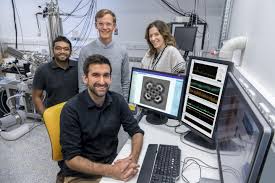Source: eurekalert.org
An Australian-German collaboration has demonstrated fully-autonomous SPM operation, applying artificial intelligence and deep learning to remove the need for constant human supervision.
The new system, dubbed DeepSPM, bridges the gap between nanoscience, automation and artificial intelligence (AI), and firmly establishes the use of machine learning for experimental scientific research.
“Optimising SPM data acquisition can be very tedious. This optimisation process is usually performed by the human experimentalist, and is rarely reported,” says FLEET Chief Investigator Dr Agustin Schiffrin (Monash University).
“Our new AI-driven system can operate and acquire optimal SPM data autonomously, for multiple straight days, and without any human supervision.”
The advance brings advanced SPM methodologies such as atomically-precise nanofabrication and high-throughput data acquisition closer to a fully automated turnkey application.
The new deep learning approach can be generalised to other SPM techniques. The researchers have made the entire framework publicly available online as open source, creating an important resource for the nanoscience research community.
FULLY-AUTONOMOUS DeepSPM
“Crucial to the success of DeepSPM is the use of a self-learning agent, as the correct control inputs are not known beforehand,” says Dr Cornelius Krull, project co-leader.
“Learning from experience, our agent adapts to changing experimental conditions and finds a strategy to maintain the system stable,” says Dr Krull, who works with Dr Shiffrin at Monash School of Physics and Astronomy.
The AI-driven system begins with an algorithmic search of the best sample regions and proceeds with autonomous data acquisition.
It then uses a convolutional neural network to assess the quality of the data. If the quality of the data is not good, DeepSPM uses a deep reinforcement learning agent to improve the condition of the probe.
DeepSPM can run for several days, acquiring and processing data continuously, while managing SPM parameters in response to varying experimental conditions, without any supervision.
The study demonstrates fully autonomous, long-term SPM operation for the first time by combining:
- an algorithmic approach for sample area selection and SPM data acquisition;
- supervised machine learning using convolutional neural networks for quality assessment and classification of SPM data, and
- deep reinforcement learning for dynamic automated in-situ probe management and conditioning.


